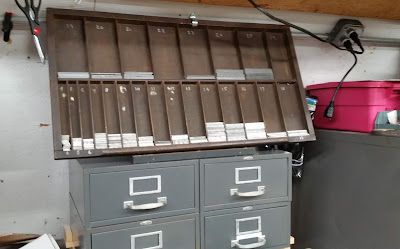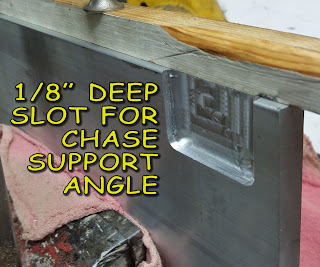Part 3
Reworking (or replacing) the spring-loaded clamp bolts
Before we get to that: On my press, the roller arms are not centered on the chase bed, and the left arms literally drag along the roller track. On the right side, the clearance is about 1/4" inch. I guess in a perfect world, the clearance on each side should be about 1/8", but with the several breaks and welds on my press, I'm glad the various parts still move at all.
This excellent photo shows the interference between the parts:
Don't try to bend cast metals
I didn't even consider trying to adjust this tight fit by bending or heating. I resorted to an old-school method.
Several authoritative strokes with a good file removed a few thousandths of an inch from the arm and from the track and now things move smoothly and without that dreadful dragging sound.
The spring-loaded clamp bolts
These bolts are designed to lock onto tabs on the original closed-bottom chase, and I think Kelsey did a pretty good job in that area.
Here's a picture from Alan Runfeldt's Excelsior Press blog (something to check out if you love old printing presses). The chase has a tab on each side to lock into the spring bolts.
This chase would be pushed downward along the chase-bed and would engage two large-flange spring-loaded bolts. The flanges would lock the tabs against the bed.
Note: When I started this project, I had no idea how this chase looked or how the bolts would clamp it down, thus my complicated drawings and dimensions in part 1 of this story.
Many thinks to Alan Runfeldt for his expertise and advice and photos to guide me in a better direction.
The next two photos show the bolts on my press. In the first one, I'm pressing the bolt as far as it will go (spring fully compressed at my finger). It extends a bit more than 1-1/8", which is exactly right for a chase of 3/4" thickness and my home-made chase bed of 3/8" (The math: 3/4" = 6/8", plus 3/8" equals 9/8" equals 1-1/8").
This second photo shows the opposite (left) end with my chase bed clamped with the bolt flange (bolt head). There's still lots of room for the bolt to extend and grab the chase.
Cautions
I noticed that these spring bolts interfered with the motion of my press unless the chase bed (that I made) was clamped on the base. If not, the opposite ends of the bolts will block the frame of the press as it moves to print.
The solution, of course, is to always have the chase bed installed, and there's no reason not to.
Another problem may be specific only to my press with its welds and distortions. A newer 6X10 chase would not fit between the bolts. I had to reduce the diameter of each bolt by about .05 inches. This is an easy task with the old cast-iron (I think) bolts. They file and machine like graphite.
But they are brittle, and I broke one—so I bought some 1/2" X 2-1/2" carriage bolts and filed one down to make a new bolt with a somewhat smaller shoulder. I machined the crown on the head to match the existing bolt (if you don't look too closely). The head of the carriage bolt has a diameter of one inch, exactly the same as the Kelsey bolt head.
The next step
At this stage of the game, I'm pretty sure that this monster can be brought to life and can be used as more than a door stop. With that in mind, I have placed an order for two 6X10 ink rollers. We will soon know.
Next: Will it print?




































